Comments and Issues
Shhhhhhhhh, National Assembly asleep!
Published
2 years agoon
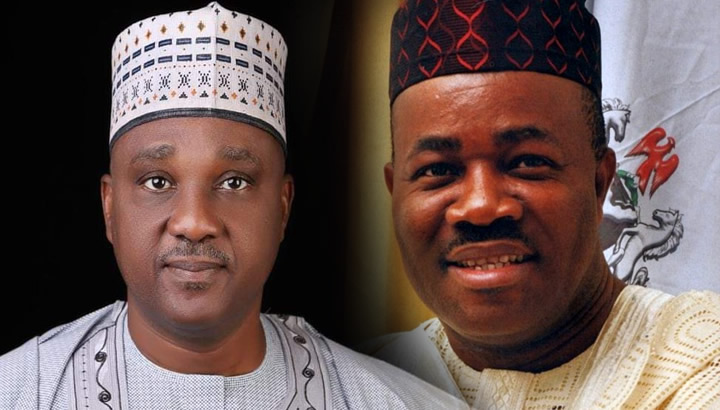
By Hon. Josef Omorotionmwan
A combined reading of sections 80, 81, and 82 of the Constitution of the Federal Republic of Nigeria, 1999 (as amended), easily reveals that the makers of our constitution had the best intention for the nation and its finances, hence they gave us a system of accounting that was made into a watertight compartment, a system which thrived on the sound accounting principle that for every debit, there must be a corresponding credit; a system in which at the beginning of the financial year, the Legislative Assembly would sit down and carefully distribute the estimated revenue to the different departments of Government in such a way that pilfering was almost completely eliminated!
The system also recognized that in the course of the financial year, there would occasionally arise some revenue and expenditure items that were not foreseen at the time of passing the year’s Appropriation Bill.
In obedience to the tenets of the Consolidated Revenue Fund, such unforeseen revenues and expenditures are accommodated within the context of Supplementary Appropriations.
In the type of pseudo system that we operate, the National Assembly is supposed to authorize every project and appropriate funds for its execution. In essence, no project can ever exist without legislative approval and authorization. That was the noble intention.
In utter contradiction to the above arrangement, as imperfect as it is, one still gets the impression that after the hurly-burly of what they call the appropriation period of about two months from November to December, the National Assembly simply goes on recess for the rest of the year. That’s a permanent recess!
In the 10 months of their recess, the President steps in to play the role of the National Assembly. Of course, this is good. After all, nature abhors a vacuum. One man now becomes the President, Commander-in-Chief extraordinaire for the entire country. Essentially, the National Assembly has now constructively defined itself as a part-time Legislature. This almost lends total credence to the idea that many Nigerians have canvassed for too long that what Nigeria needs is a part-time Legislature, preferably unicameral, that would meet a few weeks in the year; to rapidly approve a budget for the President; and give amendatory approval for actions taken by the President while they were away.
Members of such National Assembly would be entitled to sitting allowances for their few days of work.
Contrarywise, we have in Nigeria today, a National Assembly that is earnestly part-time but gets full-time pay and in the end, this produces a Sole Administrator as President! We lose on all fronts.
The pitfalls here are many. We shall attempt to restrict ourselves to the most recent happenings.
Recently, our state governors sat down somewhere in Abuja in what was called a meeting of the Council of States. They awarded themselves N5 billion each as palliatives to cushion the effect of subsidy removal on their citizens. We hear that N2 billion has been released to each of the governors. In some states, all that left the award was the cost of announcing on television that the state was going to make its transport service free to all its citizens – even where it was clear that there was not a single bus left in the transport service.
Essentially, the entire amount was “palliated” into the governor’s pocket.
With the loud noise that greeted the initial release, we may never know what has happened to the balance of N3 billion.
We are only concerned here with the extrabudgetary nature of the transaction. We searched but in vain, to find the source of this expenditure item. It is nowhere in the 2023 Appropriations.
We quickly assumed that it must have been tapped from savings from the fuel subsidy removal. That makes it more offensive. We have not seen this supplementary appropriation that brought the amount into the Consolidated Revenue Fund.
Palliatives have since become the name of the game. Where is the National Assembly in all this? The President is constantly in a tug of war with organized labour. At the peak of their imbroglio, we saw an accountable organized labour that constantly said “we shall take this to our members and see what they think about it”.
We also expected to see a President who would say, “I hope I get the necessary approval from the National Assembly.”
Instead, we saw an unaccountable Presidency that did not think there was a role for the National Assembly. It took the National Assembly for granted.
Occasionally, when the Speaker and the Senate President intervened, they only did so to plead for the President — the very President who had pleasantly usurped their functions.
In all magnanimity, the President is everywhere creating programs and projects, and dishing out money for them, in a system where no project and program should exist without legislative approval and appropriation.
Apparently, the National Assembly has since abandoned its duty post and the President is wallowing in illegalities!
Of course, this is the way it has always been. Has the National Assembly ever interrogated the working of the illegal Excess Crude Account? Is that not the same source of slush funds of all sorts, including hundreds of billions of Naira for the appeasement of the Cattle Rearers Association? Even in the face of the preponderance of evidence, can the National Assembly ever have the guts to interrogate the extent to which repatriated loots have been blatantly relooted? Is it not now clear that compared with our extra-budgetary outlays, our annual appropriations fritter into microscopic insignificance? No thanks to a sleeping National Assembly! Before now, we were familiar with the aphorism – Why pay a Lawyer when you can buy the Judge? This is fast shifting to, Who needs the National Assembly when you can go to the President? What an exercise in self-reductionism!
We have no problem with the Legislature that chooses to tie itself up to the apron strings of the Executive. But it cannot be done at the expense of the Doctrine of Separation of Powers abundantly enshrined in our constitution.
The Doctrine recognizes, inter alia, that every policy has two component parts – formulation and execution – none of which is less important.
Admittedly, jaw-jaw is better than war-war. But a Legislature that abandons it’s duty post in the name of cooperating with the Executive, will soon find itself on the path of self-destruct; and that too much cooperation destroys cooperation. Shakespeare is relevant here: “Honour and shame on no part arise; act well your part and there the honour lies”.
It is time to wake up!
You may like
Natasha: Ex-Lawmaker urges Akpabio to step aside for impartial investigation
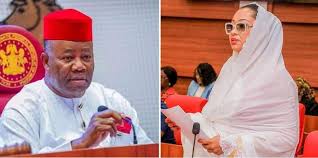

Court orders Akpabio, others to file defence in Natasha’s suit
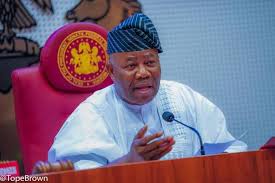

Senate declares Edo Central Senatorial District vacant


Senate resumes, pledges to work hand in hand with Executive
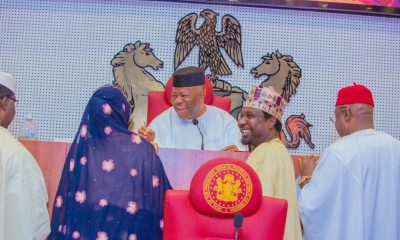

Senate resumes plenary after 30 days recess
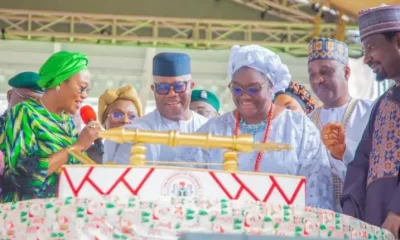

Akpabio @61, an extraordinary man, uncommon in our generation – Remi Tinubu
Trending

 Entertainment1 week ago
Entertainment1 week agoSinger Simi faces backlash after TikToker admits to false rape allegation

 Entertainment5 days ago
Entertainment5 days agoSimi addresses resurfaced 2012 tweets amid online backlash

 Comments and Issues1 week ago
Comments and Issues1 week agoNigeria’s Declining Oil Output and Soaring Foreign Portfolio Investment Inflow

 Comments and Issues1 week ago
Comments and Issues1 week agoEx-prince Andrew’s arrest, lessons for Nigeria

 Comments and Issues1 week ago
Comments and Issues1 week agoThe Seyi Tinubu’s jellof rice, loaves of bread

 Health7 days ago
Health7 days agoSCFN, LUTH introduce bone marrow transplants as curative treatment for sickle cell

 Health3 days ago
Health3 days agoDeclassified CIA memo explored concealing mind-control drugs in vaccines

 Football7 days ago
Football7 days agoHarry Kane nets brace as Bayern edge Frankfurt 3–2 to go nine points clear

